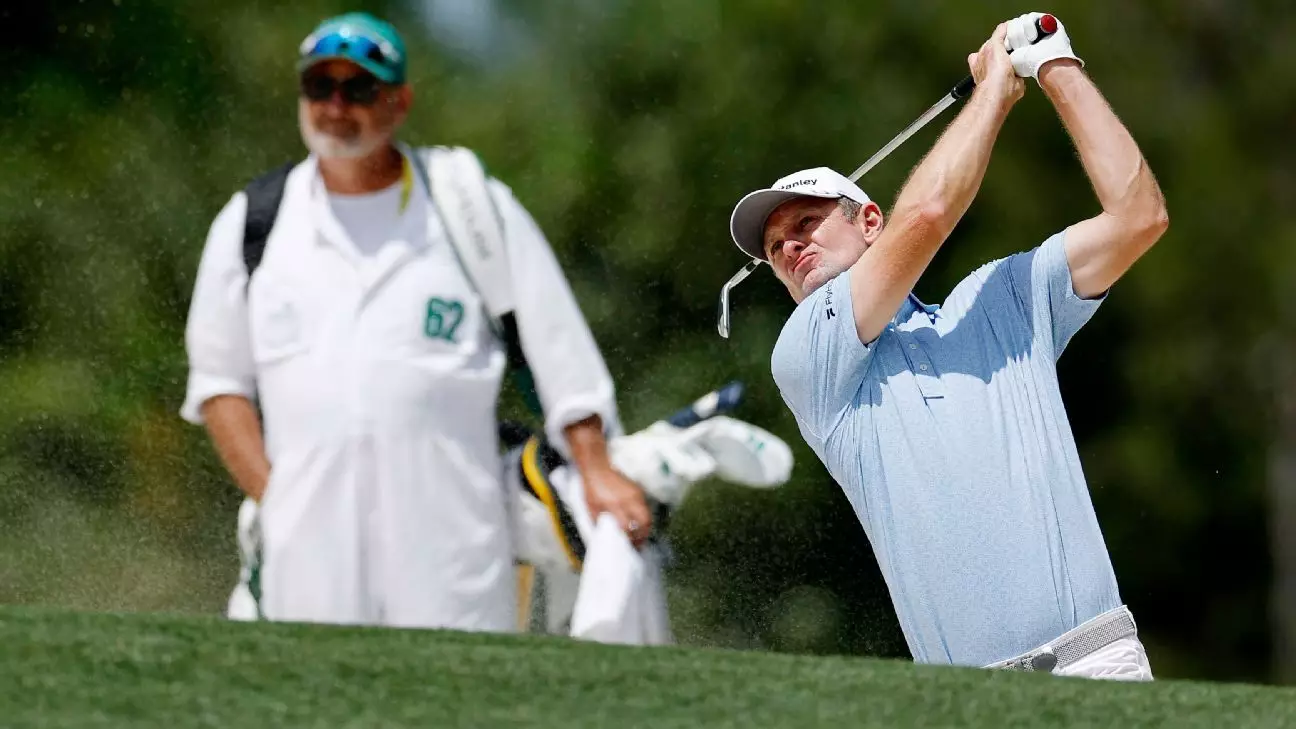In an age where golf is continuously evolving with fresh talent and soaring expectations, Justin Rose’s performance at Augusta National during the Masters has taken the spotlight, leaving seasoned competitors like Scottie Scheffler and Rory McIlroy in his impressive wake. Despite the pressure of competing against big names and the weight of history that Augusta carries, Rose delivered a breathtaking 7-under 65 during the tournament’s opening day. This remarkable feat not only showcased his unwavering skill but also illuminated the stark reality of the game: talent does not always translate into victory unless it is accompanied by opportunistic timing.
Rose’s ability to launch himself into a commanding three-shot lead is no minor accomplishment. The seasoned golfer, at 44, understands the peculiar relationship between age and opportunity in the sport. Each swing he takes could potentially be one of his last great opportunities on this hallowed ground. “It’s not going to get easier for me in the next five, ten years,” he remarked, shedding light on the psychological façade that many elite athletes maintain. Rose’s acknowledgment of his limited timeframe injects a sense of urgency—a sentiment that resonates not just in sports but in life itself.
The Ghosts of Augusta: A Haunted Past for McIlroy
On the other side of the leaderboard stands Rory McIlroy, whose aspirations and frustrations seem perpetually intertwined at Augusta. Desperate to clinch a green jacket that would complete his career Grand Slam, McIlroy has found himself on the edge of the abyss time and again. His latest outing left him tangled in a web of double bogeys as careless misjudgments claimed his momentum late in the game. The emotional rollercoaster evident in McIlroy’s performance hints at deeper psychological struggles—struggles that manifest as tangible mistakes on the esteemed grounds of Augusta.
History has shown us that the burden of expectation can shatter even the most gifted players. McIlroy’s seventh consecutive failure to break 70 in the Masters’ opening round isn’t merely statistic—it’s a glaring reminder of how the past can haunt someone future. In stark contrast to Rose’s flight path, McIlroy’s journey is marred by near-misses and regrets, serving as a powerful reminder of the fragile nature of success in this unforgiving environment.
When Names Carry Weight: The LIV Team’s Paradox
Golf is steeped in tradition, and attending the Masters is a rite of passage for many. Yet, as the sport develops and new formats emerge, the LIV Golf movement introduces an entirely different dynamic to this historic tournament. Bryson DeChambeau and Tyrrell Hatton exemplify the complexities of this new wave, both players carrying the LIV Golf banner with their commendable scores of 69. However, standing in the shadows of a traditional event like the Masters, their presence often invites scrutiny rather than praise.
By participating in the tournament amidst visible disdain and skepticism, these players embody the paradox of modern golf. Their achievements are perhaps diminished by the storms swirling around them concerning loyalty, competition, and the evolution of the game itself. Ultimately, the once straightforward atmosphere, marked by tradition and camaraderie, is now riddled with debates about integrity and allegiance, complicating the relationships between players and the larger golfing community.
The Emotionally Charged Theater of Golf
What unfolded at Augusta one sunny day was more than just a sporting event; it was an emotionally charged theater filled with audacity, hope, and ambition. The day was lifted by inspiring performances, from the likes of 65-year-old Fred Couples, who not only broke par, but proved that age can be a mere number in a game that thrives on mental agility. The juxtaposition of young and old is fascinating, echoing the broader societal dynamics we see across various fields today.
And yet, amidst triumph, there lies despair. Young golfer Nick Dunlap’s erratic performance reminds us of the pressing burden some newcomers carry. A promising amateur tarnished with a dreadful 90 creates a poignant narrative—of dreams colliding with harsh reality. The mental toll of the game extends beyond mere scores; it becomes an intense psychological battle where one’s resolve is constantly tested.
In many ways, golf—much like life—is about resilience. Justin Rose’s triumph was a beacon, shining brightly against a gloomy backdrop where seasoned champions and young hopefuls alike navigate the complexities of their profession. The stakes are undeniably high, and as the Masters unfolds, it becomes evident that the only constant in this spirited game is change itself, continually driving players to adapt, evolve, and compete in uncertain waters.

